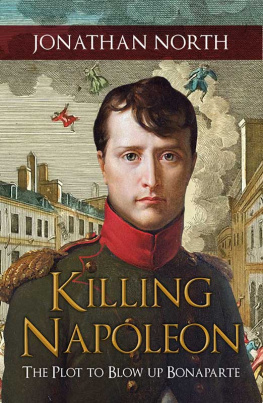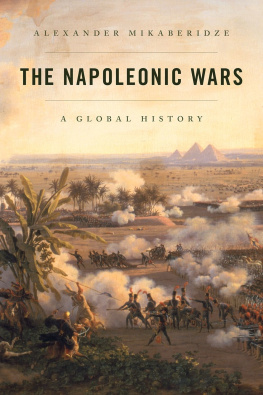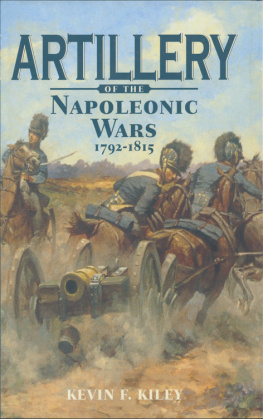THE NAPOLEON OPTIONS
Alternate Decisions of the Napoleonic Wars
New Extended Edition
THE NAPOLEON OPTIONS
Alternate Decisions of the Napoleonic Wars
New Extended Edition
Edited by Jonathan North
Frontline Books
A Greenhill Book
THE NAPOLEON OPTIONS
Alternate Decisions of the Napoleonic Wars
First published in 2000 by BCA in association with Greenhill Books, Lionel
Leventhal Limited
www.greenhillbooks.com
This extended edition published in 2016 by
Frontline Books,
an imprint of Pen & Sword Books Ltd,
47 Church Street, Barnsley, S. Yorkshire, S70 2AS
Each chapter copyright its author, 2000, 2016
Introduction copyright Jonathan North, 2000
Preface to extended edition copyright John Grehan, 2016
The right of these individuals to be identified as the author of this work has been asserted by them in accordance with the Copyright, Designs and Patents Act 1988.
The collective work and maps copyright Lionel Leventhal Limited, 2000, 2016
ISBN: 978-1-47389-784-7
eISBN: 978-1-47389-786-1
Mobi ISBN: 978-1-47389-785-4
All rights reserved. No part of this publication may be reproduced, stored in or introduced into a retrieval system, or transmitted, in any form, or by any means (electronic, mechanical, photocopying, recording or otherwise) without the prior written permission of the publisher. Any person who does any unauthorized act in relation to this publication may be liable to criminal prosecution and civil claims for damages.
CIP data records for this title are available from the British Library
For more information on our books, please visit
www.frontline-books.com
email
or write to us at the above address.
Contents
Introduction
Preface to the Extended Edition
The Contributors
Chapter 1 That Most Vulnerable, and at the same time, Most Mortal Part
Paddy Griffith
Chapter 2 Bonapartes Campaign in Egypt
Charles S. Grant
Chapter 3 Holding the High Ground: The Battle of Austerlitz, 1805
Martin Mace
Chapter 4 Junots Victory in Portugal, 1808
Philip Haythornthwaite
Chapter 5 Decision on the Danube: The First French Crossing of the River in 1809
Kevin F. Kiley
Chapter 6 Decision in Bavaria: The Austrian Invasion of 1809
John H. Gill
Chapter 7 If Boney Had Been There: The Battle of Fuentes dOoro, 3-5 May 1811
John Grehan
Chapter 8 The Russians at Borodino
Digby Smith
Chapter 9 The Race for the Borisov Bridge
Jonathan North
Chapter 10 Victory at Kulm, The 1813 Campaign
John G. Gallaher
Chapter 11 The Death of a Dream: The Battle of New Orleans, 1815
Gareth Glover
Chapter 12 What if Constant Rebecque Had Obeyed Wellingtons Order
Peter Hofschrer
Chapter 13 Napoleon and Waterloo
Andrew Uffindell
Chapter 14 Ambush at Quatre Bras
Colonel John R. Elting
Appendix Order of Battle of the French Forces for the Invasion of Ireland, 1796-1797
List of Maps
Ireland in 1796
The Meditteranean in 1799
The Battle of Vimeiro
Decision on the Danube
Battle of Fuentes DOnoro
The Battle of Borodino
Decision at the Beresina, November 1812 166
The battles of Dresden and Kulm, 1813 190
The Battle of New Orleans
Positions of the armies at 10.00 on 17 June 1815 230
Battle of Waterloo, 18 June
Battle of Waterloo, 19 June
Introduction
T he Napoleonic Wars recast Europe and the world by turning upside down the established order of politics, society, expectation and geography. No other conflict in history produced so many reverberations and indisputable legacies.
The very importance of that global conflict means that, inevitably, historians have been asking the compelling question what if things had been different? ever since the final shots died away.
That basic question was the genesis of this book. Alternate history is a kind of time travel, which itself has been an inspiration for writers since the eighteenth century as Samuel Maddens Memoirs of the Twentieth Century (published in 1733) and Louis Sebastien Merciers Memoirs of the Year Two Thousand Five Hundred (published in 1771) testify. But instead of going forward, alternate history delights in going back not looking at how our world will be different, but studying how it might have been different but for one or two minor brush-strokes on the canvas of history. Alternate history plays on, and exaggerates a little, one of the chief beauties of history nothing is without consequence. Even a small, seemingly minor, event has meaning a lost letter, an accident at birth or accidental birth, or a fall downstairs. Speculation on these chances and possibilities produces alternate history and has done so, surprisingly, for more than 150 years.
This book therefore belongs to a strong if neglected genre and follows in the footsteps of a number of enriching images of world history as it might have been. The first alternate history to be of interest to the Napoleonic scholar, and indeed one of the pioneers of the genre, is undoubtedly Napolon et la conqute du monde, 1812-1823: histoire de la monarchie universelle by Louis-Napolon Geoffroy-Chteau published in 1836. This fascinating book creates a fantasy world in which Napoleon, after defeating the Russians in 1812, conquers the world and imposes universal order and, inevitably, progress. Geoffroy-Chteau cleverly switched reality so that historical facts become fictional fantasies while the alternate versions are presented and accepted as fact. Although not the first alternate history, it was certainly the first of any length.
Of equal importance and interest to the Napoleonic alternate historian are the wide variety of essays and articles occasionally gathered into anthologies such as The Ifs of History (1907) and If it Had Happened Otherwise (1931), but frequently published in journals and periodicals which take a new look at many periods of history. Such writings came into great favour at the end of the nineteenth century in particular. Covering all historical eras, their authors included such eminent scholars as Philip Guedalla (on a Moorish Spain), G.K. Chesterton (on Mary, Queen of Scots), Harold Nicolson (on Greek independence) and Winston Churchill (who wrote a sparkling alternate history of Gettysburg). Andr Maurois (on a France unchallenged by Revolution), Hilaire Belloc (on Louis XVIs attempt to escape France in 1793), and G.M. Trevelyan (on a Napoleonic victory at Waterloo), among others, covered the Napoleonic Wars.
Recent years have seen a renewed interest in alternate history and this book follows on, to some degree, from the likes of The Hitler Options (1995), Gettysburg: An Alternate History (1997), For Want of a Nail (1973 and 1997) and What If? Explorations in Social-Science Fiction (1982).
















